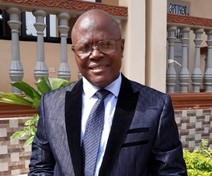Syl-Brians Kamara Alumni Profile
The Columbia Center on Sustainable Investment (CCSI) launched an Alumni Profile Series in which alumni of CCSI’s Executive Training on Sustainable Investments in Agriculture are interviewed about their career paths.
In this profile, Syl-Brians Kamara, Deputy Director in charge of Field Operations and Extension at the Environment Protection Agency in Sierra Leone, and a 2016 Executive Training alumnus, provides insights into environmental protection, environmental regulations, and engaging local communities on issues related to their environment and livelihoods.
1. What do you do for work? What does a typical day look like?
I am the Deputy Director in charge of Field Operations and Extension at the Environment Protection Agency in Sierra Leone. I directly supervise 14 core technical staff and several other staff who carry out special monitoring operations.
I typically start my day reviewing matters that have carried over from the previous day. Next, I review companies and projects whose Environmental Permits are due for renewal, environmental management report submission, or environmental monitoring and inspection. I also review correspondences/assignments received from the CEO and other senior staff members. This sets my operational agenda for the day, after which I delegate tasks to my Assistant Director, Head of Programs, and Regional Staff in the Provincial Headquarter cities. Next, I respond to the CEO’s assignments and represent her in certain state meetings. Finally, I personally attend to tasks that require high-level attention.
2. How has your career trajectory led you to where you are today?
I graduated from university in 1986 with a Master’s Degree in Agronomy, specializing in Plant Protection. I started work as Agronomist in 1987. In 1990, I changed career course to focus on social issues and managed a faith-based medical program after completing a course in Health Services Administration.
Over time, I developed an understanding of how fast the cost of charcoal was rising and believed our forests would soon be gone. Therefore, I quickly pivoted to work in the newly established Environment Protection Agency in Sierra Leone in 2010, where I currently work as the Deputy Director in charge of Field Operations and Extension.
3. What is one of your most memorable moments in your career and why?
My most memorable moment is when I engaged local communities on issues related to the environment and their livelihoods. I realized that they are aware of the environmental changes taking place in their communities; however, understanding of the connection between their activities and environmental degradation was at times lacking. It is meaningful, to me and to the community members, when I can support capacity building on the relationship between their activities and environmental degradation.
4. What major issue related to sustainable investments in agriculture are you particularly interested in at the moment?
I am interested in empowering the local community to take part in large-scale investments rather than simply leasing their land to investors.
5. What was your main lesson learned or take away from CCSI’s Executive Training on Sustainable Investments in Agriculture? How do you apply that lesson in your work?
I learnt a lot from CCSI’s Executive Training, including the extent to which multinational companies wield immense power and are heavily protected by international investment law. The aspect of the training that I most appreciated was the lesson on various agricultural investment models. I believe land owners must take part in their investment either as shareholders, putting forward their land as equity, or participating in the production process as growers. While this is not entirely a win-win solution, it is not the win-lose situation of most land lease arrangements across many countries in Africa.
6. What advice would you give to young professionals in your area of work?
My advice to young professionals is, and will always be, to feed your hunger for learning more and more. CCSI can expose a lot of facts that other institutions influenced by big money are not willing to expose. Our training was conducted with participation from people directly involved in agricultural investment and the facts were exposed in their presence, so the class could learn. It was a very valuable and energizing experience!

